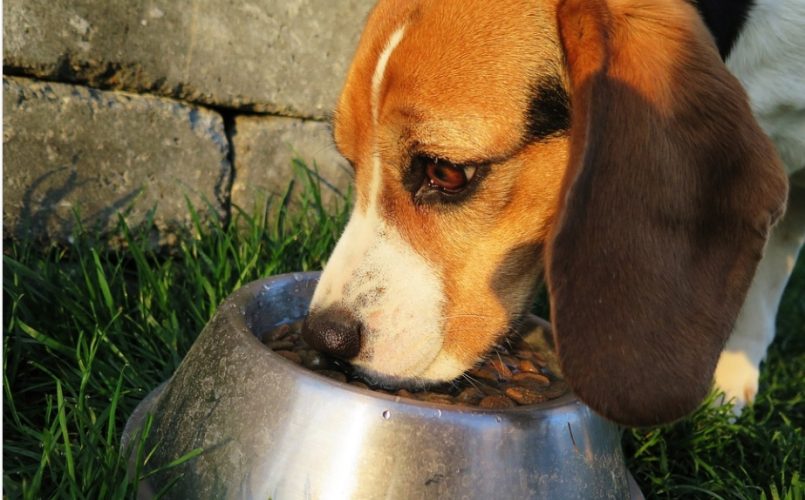Appetite Stimulant for Dogs – How to Get Your Dog Eating Again
A lack of appetite in dogs is as common as humans and may indicate a condition or illness. When you notice a significant drop in your dog’s appetite, it’s essential to determine if there is an underlying cause. In most cases, without any severe sickness symptoms, most dogs will resume eating normally. Here are some helpful ways to encourage your pet to eat, whether you’re looking for a natural or medicinal appetite stimulant.
What Causes a Dog to Lose Their Appetite?
There are many reasons why your dog may not feel like eating much or at all. If a recent change in your home or an existing health condition causes pain or stress, your pet may not feel hungry. This poor appetite may also be due to a common viral infection, nausea, upset stomach, dental problems that prevent proper chewing, as well as mental health issues, including cognitive conditions, stress, and anxiety.
If you know your dog’s medical history, you may find recurring reasons why they may not eat as much sometimes. In most cases, a poor appetite is temporary and doesn’t require professional attention unless it becomes a consistent situation that leads to malnourishment and weight loss.
Medical Appetite Stimulants
Your veterinarian can prescribe medication to help support your dog’s appetite. One of the most common medications is Mirtazapine, which increases serotonin so that your dog experiences an improved mood and appetite. Another medication that may help is Ghrelin Receptor Agonist, which boosts the hormone that triggers hunger in the brain and restores your dog’s appetite.
Natural Supplements and Stimulants
If your dog doesn’t exhibit any health concerns aside from losing appetite, there are safe, natural stimulants that can help your dog have an increased appetite. There are some great herbs, seasonings, and foods that naturally stimulate your appetite, including chamomile, peppermint, ginger, garlic, and celery seed. An herbalist or naturopath can better understand which natural supplements work best for your dog. Depending on the flavors your dog prefers, you may find some options work better for others. Garlic is also a natural antibiotic, supporting your pet’s immune system while promoting hunger.
Exercise to Stimulate Hunger
Most dogs enjoy the outdoors and play, which is not only great but also a dog appetite stimulant. Encouraging your dog to play more often and for more extended periods will stimulate appetite for dogs. If you have a senior dog that moves slower due to age or physical ailments, taking more frequent walks may promote better eating habits while increasing hunger, essential just before scheduled meal times.
Specific Food Options
Sometimes, specific foods offer a stimulating effect on a dogs appetite due to their pleasant scent. While many dogs are open to eating a wide variety of foods, you might have a picky eater, and your dogs appetite may vary depending on what’s available to eat. Poultry is one option that may trigger a dog’s hunger, especially a slow-roasted chicken or beef, due to its delicious scent. Canned dog food or wet food also has a more appetizing scent
For some pets, the way they are fed or invited to eat is essential, such as hand-feeding your dog or warming their favorite meal briefly in the microwave to enhance the aroma. You may find that most dogs welcome something new and tasty, which can titillate their taste buds with curiosity and help them enjoy their next meal.
CBD Supplements and Products for Dogs
In states where CBD supplements are legal, there are great options for pet owners, including dogs, who may benefit from cannabidiol products. Some of these products are popular with veterinarians, as they have shown promising results to reduce discomfort, pain, and nausea in humans and dogs while increasing appetite.
Before purchasing any CBD products, it’s best to consult with a medical professional to determine if this option is suitable for your pet. While some cannabinoids and other natural supplements are very effective in stimulating your dog’s appetite, it’s essential to consider the possibility of side effects due to any underlying medical conditions. While CBD is generally safe for dogs, it’s not the same as THC, which is toxic to animals and should be avoided.
If your dog requires prescription medication for a health condition, it’s crucial to rule out any possible adverse effects from the combination of CBD products and medication. As they age, many dogs develop osteoarthritis, which may benefit from CBD products developed specifically for canines by reducing pain and improving appetite.
Acupuncture
Dogs may lose their appetite due to recurring pain and chronic illness, which can cause nausea, stomach discomfort, and pain. While some conditions may not directly contribute to a loss of appetite, the resulting pain and changes in hormones can diminish your pet’s hunger. Acupuncture is a great way to ease your dog’s suffering and provide them with enough relief so that they can eat normally.
Pets with long-term illnesses such as cancer, kidney disease, diabetes, and other severe conditions, may find that the combination of side effects from medication and the illness itself reduces their ability to experience hunger. Acupuncture can ease the pain that your pet experiences from disease to have a better quality of life and enjoy regular meals.
Maintaining a Balanced Lifestyle and Diet

Senior dogs and pets with various health concerns consider all factors when addressing a lack of appetite. Suppose you suspect that your dog may be ill. In that case, it’s essential to rule out severe medical conditions and take the necessary steps for treatment, as this may alleviate issues related to a loss of appetite. Finding the right appetite stimulant for dogs requires a bit of patience at times, especially if you’re uncertain about the root cause and need more support or a medical diagnosis.
In most cases, a loss of appetite is temporary, and most dogs resume regularly eating after a short time. Often, this happens when there’s a change in diet, either due to age or health reasons, a moving to a new home or a change in household size, and other life events that impact dogs in a significant way.
Summary
Your dog is a part of the family. They may experience sadness, anxiousness, excitement, and other emotions or feelings that can impact their ability to feel hungry or reduce their appetite at times. Sometimes, a stressful day can result in a skipped meal or completely shift your regular eating times. This happens to dogs too, and often lasts a day or two until they feel better again.
If your pet requires a special diet, it’s essential to give them the highest quality food while maintaining the specific requirements, such as low or no sugar or low-calorie diets. Consistency is essential in lifestyle and diet. While environmental changes impact your dog’s behavior and eating habits, it’s essential to consider this when their appetite decreases.
There are many great appetite stimulants for dogs for short-term and ongoing support so that your furry companion can enjoy a healthy lifestyle. Balance is key to achieving a good routine by walking, playing, and spending time with your dog, so they naturally develop an appetite during meal times and feel secure and happy. Exercise is one of the best treatments and preventative measures for ensuring your dog maintains an active, healthy life.

